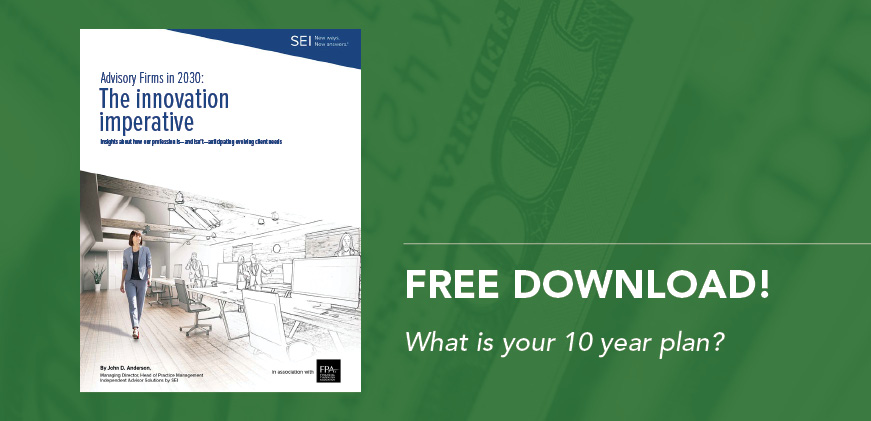It’s true in all industries, and the world of finance is no exception: those who refuse to evolve will be left behind.
Older generations of investors aren’t getting younger, and literally trillions of retirement savings and other sources of wealth hang in the balance. Advisors who maintain strong, meaningful relationships with clients and the next generation stand to benefit, while those who don’t can expect to be greeted with plenty of ACATS requests.
Though some financial professionals view fintech tools with suspicion, the truth is that clients appreciate these modern conveniences for a reason. By using fintech to provide a better experience—and expertly guiding investors through turbulent financial waters—the most adaptable and dedicated advisors will thrive.
All of this is to say that it’s crucial to start planning for the next decade right now. But how can advisors set themselves up for success?
In his 2019 whitepaper, “Advisory Firms in 2030: The Innovation Imperative,” John D. Anderson explores the challenges facing today’s financial professionals in great detail.
Anderson from SEI is the Managing Director of the Practice Management Solutions Team for Independent Advisor Solutions. He’s responsible for all programs focused on helping financial advisors grow their businesses, create efficiencies in their operations, and differentiate their practices. He’s also the lead author of SEI’s practice management blog, Practically Speaking, which has the goal of helping advisors grow better client relationships and market more effectively.
Despite the very real consequences that come with not meeting the wealth management needs of new clients, Anderson posits that most financial advisors simply aren’t planning ahead. There’s no one reason for this, but here are a few commonly cited:
- The market has been strong enough that they haven’t had to.
- Advisors are too busy to plan ahead.
- Advisors don’t see anything wrong with the way they are currently doing things.
Of course, advisors who don’t plan ahead or adapt do so at their own peril. It’s incredibly important to stay on top of trends, while also leveraging fintech to create better experiences for clients.
Anderson cites numerous studies, including an SEI survey of emerging affluent, mass affluent, and high-net-worth households, as well as an online survey of financial planners. He uncovered some surprising information about how advisors are currently using fintech and adapting to a rapidly changing world.
According to the report and about advisors:
- Of those surveyed, 76% don’t segment their client lists.
- Only 9% meet with clients virtually.
- Rather than consider themselves specialists, 48% consider themselves “generalists.”
These findings suggest that most advisors could stand to do better when it comes to creating a niche and offering clients a more personalized (and convenient) customer service experience—an important lesson for financial professionals looking to maintain a more robust book of business in the years ahead.
Anderson’s whitepaper takes an honest look at the current state of the wealth management industry, while offering actionable steps advisors can take to ensure their practices thrive over the next decade. To download the free report, click the link below.









 Apple Podcasts
Apple Podcasts
 Google Play
Google Play
 Spotify
Spotify















